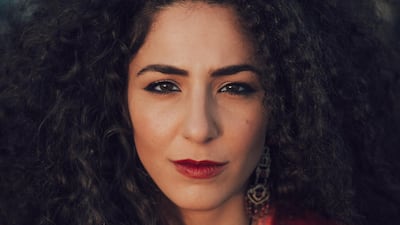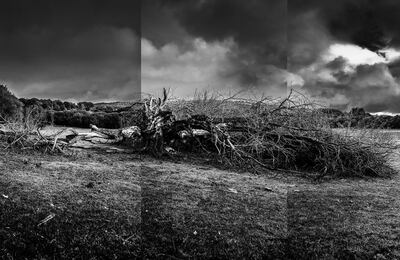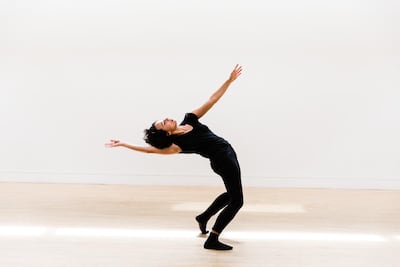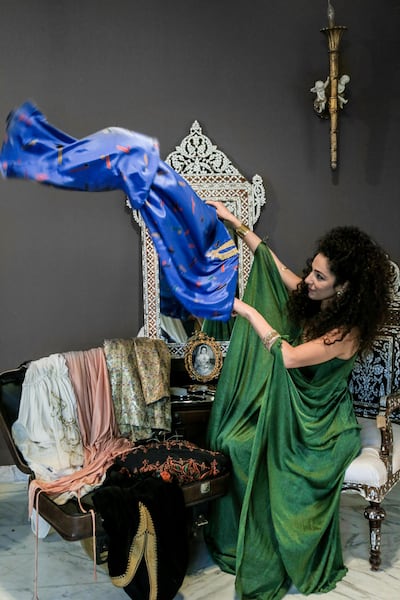Dana Dajani will be bringing her unique craft to the people of Liverpool as part of a wide-ranging celebration of Arab culture in the British city.
The Liverpool Arab Arts Festival opens on Friday and will showcase the work of artists, musicians, dancers and writers in a week-long celebration.
The Palestinian poet and actor spends time between Dubai and Amman, but has fallen for Liverpool while preparing for her role as artist in residence at the festival, where she will not only perform but hold workshops to help others find their voice.
Her first trip to the northern city proved confusing, then delightful, says Dajani, who was also winner of the Emirates Woman Artist of the Year award in 2016.
"I went to Liverpool for the first time last Halloween," she tells The National. "I was surrounded by people in costume and I kind of leaned in and I thought, there's a lot of tourists here in Liverpool – where are these people from?
“Then I realised it was the Scouse (Liverpudlian) accent that I really could not understand.”
Since then, she has come to love the city, famous for football, the Beatles and as a port city in the 19th and 20th centuries. Dana loves the people – and their reaction to art.
“I can’t even tell you the warmth of the reception,” she says of her last performance in the city. “The audiences are just so attentive and willing to reach out and connect afterwards and I get to speak to so many inspired and inspiring people.”
Liverpool's history with the Arab world goes back far longer than Mohammed Salah's signing for one of the city's two world-class football clubs. The city is home to the first mosque in the UK, built in 1887 and still operational today, and due to its important role in shipping and trade, has always welcomed people from a variety of countries. Fast forward to 2002 and a group of parents living in Liverpool were struggling to find a way to connect their children with their Arab heritage. What started as a handful of events taking place over a weekend has now grown into a two-week event featuring myriad artists and performers from across the Arab world.
The festival's organisers feel Liverpool's history and open, welcoming population create the perfect setting to celebrate other cultures.
"Liverpool is definitely the right place for this project," says Jack Welsh, the festival's co-ordinator. "What you find here is that notion of collaboration and willingness to explore new ideas. We've found that people understand it and want to take part and really value creative responses."
This year’s LAAF theme will challenge those who come across it to think more deeply about their daily exchange with the world around them.
It revolves around a striking piece of work by campaigner and artist Beau Beausoleil, whose collaborative project Shadow and Light will be on display throughout the week.
The project asks artists and academics to create works to honour the lives of more than 400 Iraqi academics killed in targeted assassinations between 2003 and 2012. Participants are given the name of the murdered person and the details of their death and are charged with creating a piece in their honour. LAAF is hoping 12 British artists will contribute to the project in time for the opening.
"The challenge seems almost ridiculous when you think about the impossibility of memorialising a life through three sentences describing the factual details of their murder," says Welsh. "But that's the point. That act of creativity is a beautiful thing." Dana says she also has the festival to thank for forcing her to finish a piece of work she has been ruminating over for the last six years. Her one-woman performance Heroine with a Thousand Dresses will close the festival with a riot of colour, feminism and deep personal connection.
Using reels of film footage from the 1970s and hundreds of dresses spanning decades given to her by her jet-setting Palestinian refugee grandmother, Dana tells a story "which is her story and my story and the story of the universal feminine".
“Each of these dresses is a different woman, a different persona, she says.
"I use the dresses as access points to go into mythology and history to talk about multiple narratives in this kind of weaving of what is feminine identity today."
Other artists dropping in to share their craft at the festival include Lisa Luxx, Amina Atik and Juliana Yazbeck.
Here’s what not to miss at Liverpool Arab Arts Festival:
Shadow and light
An essential exhibition to fully understand this year’s theme, Shadow and Light will be on display throughout the festival. Organisers asked a range of international artists, writers, poets, activists and teachers to create works reflecting their lives. Hosted by the Northern Lights building in the Baltic Triangle area, visitors will see new contributions to the project by Merseyside artists.
July 6-July 13, 12-6pm, Northern Lights Building, free
ēvolvō and One Day and One Night – Beirut

Visual artist and performer Yara Boustany presents a rip-roaring journey from the mountains of Lebanon to the bustling streets of Beirut, accompanied by stunning visuals with ēvolvō. The story features a strange creature invading the city, leading the audience to ask "is it an ancient monster or an image of the city drowning in plastic pollution"? The audience will also be treated to another, shorter work, One Day and One Night Beirut.
July 11, 7.30pm, Unity Theatre, £9
Gesturing refugees
Ticket-holders can expect a lot of audience participation in Farah Saleh’s interactive dance performance. The cast, which includes refugees, will reveal hidden stories of refugeehood, encouraging those present to think about the connection between the West and displaced people. The show aims to re-appropriate the narrative of refugeehood and develop a collective identity which places refugees at the forefront instead of presenting them as passive victims.
July 6, 2:00 - 3:15pm, Bluecoat, £7
Heroine with a Thousand Dresses
In this world premiere, Dana Dajani examines femininity through the wardrobe of her fashion-boutique-owning grandmother. Expect a dissection of image and identity, style, sexuality, and standards of beauty in contemporary society as Dajani changes into each dress. The outfits and Dajani’s narrative will be accompanied by film taken by her grandmother.
Heroine with a Thousand Dresses by Dana Dajani has its world premiere on July 13, 7:30pm to 8:30pm, Bluecoat, £7





